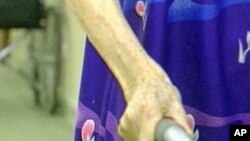A new study suggests that Alzheimer's Disease is more likely to be inherited through the mother than through the father.
But the study has limitations. There is no definitive test for Alzheimer's Disease, except examining the brain in an autopsy. So physicians and researchers have to use stand-ins, or proxies, to determine whether someone has the disease. A physician may give an elderly patient a memory test, or ask family members about behavioral changes.
Researchers in this study used MRI scans to look for shrinking brain tissue.
Robyn Honea of the University of Kansas Medical Center says a certain amount of shrinkage is a normal part of aging, but some of the people in their study lost more brain tissue than others.
"What we found is that really there wasn't that much difference between people that had a father with Alzheimer's disease and those that had no family history," Honea explains. "However, the group that had a mother with Alzheimer's disease had more shrinkage, primarily in two different areas of the brain."
The parts of the brain where they observed this shrinkage are associated with memory, and are areas that typically atrophy in Alzheimer's patients.
But a change in brain volume doesn't necessarily signal the onset of Alzheimer's. Honea says they gave tests to measure loss of memory and other brain functions over the two years of the study.
"We did measure cognitive change, but they didn't have significantly more cognitive change than any of the other groups," she said.
This is a relatively limited study, with just 53 people. And Honea is careful to point out that family history is an established risk factor for Alzheimer's, so the fact that people whose mother had Alzheimer's show more brain atrophy doesn't mean that the disease is only inherited through the mother.
"We know that people that have a mother or a father [with Alzheimer's disease] are at risk. We're really seeing that risk play out in the mother group in this sample. That doesn't necessarily mean that the group that had a father [with the disease] aren't at risk, too. They're just not exhibiting the same brain changes."
Honea says understanding how Alzheimer's is inherited may help researchers develop ways to prevent or treat the disease.
Alzheimer's More Likely Inherited Through Mother
- By Art Chimes

Researchers use MRI scans to look for shrinking brain tissue












